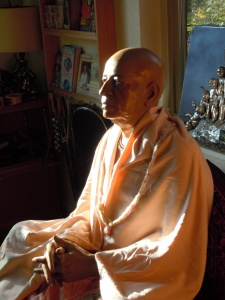“Thus for a devotee the identifier is equally a sinner, like the mischief-monger”….SP
BG 5.18—The humble sage, by virtue of true knowledge, sees with equal vision a learned and gentle brahmana, a cow, an elephant, a dog and a dog-eater [outcaste] .
Jan 18 1971
Prabhupāda: Sama-darśinaḥ means you have no distinction what is sin and what is...
Guest (1): Sama-darśinaḥ means to treat everyone as equal.
Prabhupāda: No, no, no. Sama darśinaḥ means there is no distinction between sin and virtue. That is sama-darśinaḥ. As soon as you see, “This is virtue, and this is sin,” it is not sama-darśinaḥ.
Guest (1): Virtue and sin become the same in sama-darśinaḥ.
Prabhupāda: Yes. That is sama-darśinaḥ.
Guest (2): In other words, the sin does not remain sin any longer.
Prabhupāda: That is another thing. But he has no vision that “This is sin, and this is virtue.” That is sama-darśinaḥ. As soon as you make distinction, you are not sama-darśinaḥ.
BG 4.16–Even the intelligent are bewildered in determining what is action and what is inaction. Now I shall explain to you what action is, knowing which you shall be liberated from all sins.
Note–If we see some person (or devotee) as a wrong doer then we are also guilty of that same wrong act if we do not see the hand of God within those actions.
See last quote below…
SB 1.17.18–O greatest among human beings, it is very difficult to ascertain the particular miscreant who has caused our sufferings, because we are bewildered by all the different opinions of theoretical philosophers.
PURPORT-There are many theoretical philosophers in the world who put forward their own theories of cause and effect especially about the cause of suffering and its effect on different living beings. Generally there are six great philosophers: Kaṇāda, the author of Vaiśeṣika philosophy; Gautama, the author of logic; Patañjali, the author of mystic yoga; Kapila, the author of Sāṅkhyaphilosophy; Jaimini, the author of Karma-mīmāṁsā; and Vyāsadeva, the author of Vedānta-darśana.
Although the bull, or the personality of religion, and the cow, the personality of the earth, knew perfectly well that the personality of Kali was the direct cause of their sufferings, still, as devotees of the Lord, they knew well also that without the sanction of the Lord no one could inflict trouble upon them. According to the Padma Purāṇa, our present trouble is due to the fructifying of seedling sins, but even those seedling sins also gradually fade away by execution of pure devotional service. Thus even if the devotees see the mischief-mongers, they do not accuse them for the sufferings inflicted. They take it for granted that the mischief-monger is made to act by some indirect cause, and therefore they tolerate the sufferings, thinking them to be God-given in small doses, for otherwise the sufferings should have been greater.
Mahārāja Parīkṣit wanted to get a statement of accusation against the direct mischief-monger, but they declined to give it on the abovementioned grounds. Speculative philosophers, however, do not recognize the sanction of the Lord; they try to find out the cause of sufferings in their own way, as will be described in the following verses. According to Śrīla Jīva Gosvāmī, such speculators are themselves bewildered, and thus they cannot know that the ultimate cause of all causes is the Supreme Lord, the Personality of Godhead.
…”Thus even if the devotees see the mischief-mongers, they do not accuse them for the sufferings inflicted. “
This is the conclusion of all of the above regarding misunderstandings between devotees. When bad things happen it is very easy to accuse the obvious one for some wrong doing. But that accusation means the accuser is just as guilty as the one who is the wrong doer. See below for the proof.
SB 1.17.22 purport…
A devotee’s conclusion is that no one is directly responsible for being a benefactor or mischief-monger without the sanction of the Lord; therefore he does not consider anyone to be directly responsible for such action. But in both the cases he takes it for granted that either benefit or loss is God-sent, and thus it is His grace. In case of benefit, no one will deny that it is God-sent, but in case of loss or reverses one becomes doubtful about how the Lord could be so unkind to His devotee as to put him in great difficulty. Jesus Christ was seemingly put into such great difficulty, being crucified by the ignorant, but he was never angry at the mischief-mongers. That is the way of accepting a thing, either favorable or unfavorable. Thus for a devotee the identifier is equally a sinner, like the mischief-monger. By God’s grace, the devotee tolerates all reverses. Mahārāja Parīkṣit observed this, and therefore he could understand that the bull was no other than the personality of religion himself. In other words, a devotee has no suffering at all because so-called suffering is also God’s grace for a devotee who sees God in everything. The cow and bull never placed any complaint before the King for being tortured by the personality of Kali, although everyone lodges such complaints before the state authorities. The extraordinary behavior of the bull made the King conclude that the bull was certainly the personality of religion, for no one else could understand the finer intricacies of the codes of religion.
Therefore the final conclusion-to chant the Holy Names of the Lord in a humble state of mind thinking oneself lower than the straw in the street more tolerant than the tree and be able to offer all respect of others. In such a state of mind one can chant the Holy names constantly.



